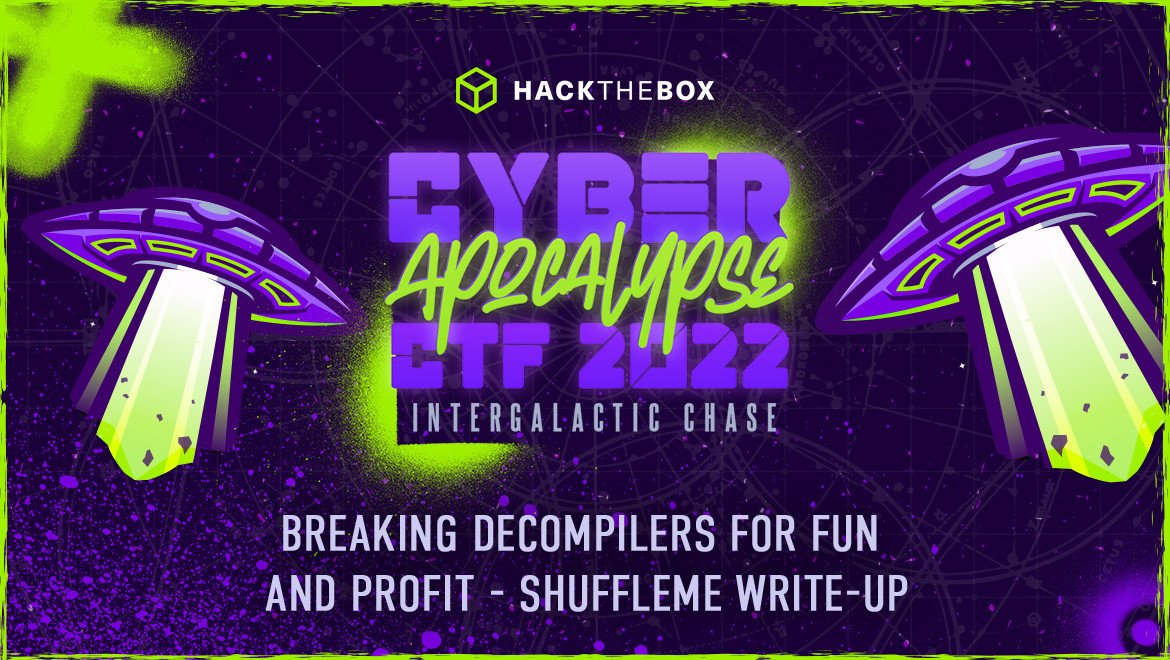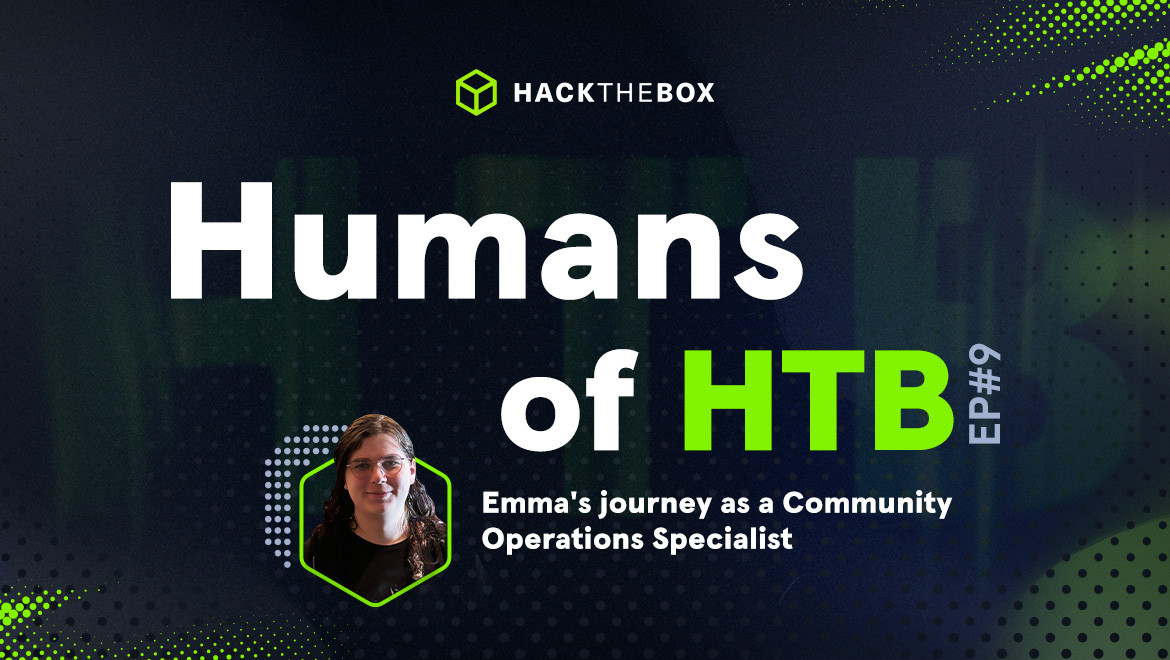Write-Ups
CA CTF 2022: Breaking decompilers for fun and profit - Shuffleme
Write-up covering the solution for the Hard Reversing challenge "Shuffleme" from Cyber Apocalypse CTF 2022.

clubby789,
Jul 22
2022
Table of Contents
Description
Intelligence indicates that the ancient data storage device you've obtained contains schematics for a never-before-seen weapon. But there's a problem - it's locked, and strange symbiotic life forms on its surface are constantly removing parts and reinserting them elsewhere. Can you get a clear picture of what's going on?
Solution
This challenge first employed an obfuscation technique that shuffled the names of functions, then made use of opaque predicates to extract cryptography keys.
For this writeup, I will be using Binary Ninja, but the process should be similar in any decompiler such as Ghidra or IDA Pro.
Initial analysis
If we disassemble the program, we see this:
00001425 int32_t main(int32_t argc, char** argv, char** envp)
00001438 if (argc != 2)
0000143f exit(status: 0xffffffff)
0000143f noreturn
00001456 if (getenv(name: "LD_BIND_NOT") == 0)
00001471 setenv(name: "LD_BIND_NOT", value: &data_2366, replace: 1)
00001487 execv(path: *argv, argv: argv)
0000149a go(argv[1])
000014a5 return 0It requires both 2 command-line arguments, and the environment variable LD_BIND_NOT to be set. If it isn’t, it re-executes itself after setting this variable. man ld.so reveals this about the environment var:
If this environment variable is set to a nonempty string, do not update the GOT (global offset table) and PLT (procedure linkage table) after resolving a function symbol.
Typically, programs on systems using the GNU C library will, when they first call a function, jump into ld.so in order to resolve the real address of the function in the library using its name. As this is an expensive process, the address is saved into the GOT for the next time the function is called. This environment variable disables this caching, forcing it to look up every time.
We can deduce that this program is therefore doing something unusual with the dynamic symbol resolution process, which we should keep in mind going forward.
000014a6 int64_t go(char* arg1)
000014b8 void* fsbase
000014b8 int64_t rax = *(fsbase + 0x28)
000014dd void var_88
000014dd extract_blob(&key_blob, 0x20, &var_88)
000014f8 void var_68
000014f8 extract_blob(&data_blob, 0x50, &var_68)
0000152e char const* const rax_4
0000152e if (blackhole(&var_88, arg1, open(file: arg1), &var_68) == 0)
00001539 rax_4 = "No!"
00001530 else
00001530 rax_4 = "Yes!"
00001543 EVP_EncryptInit_ex(rax_4)
0000154d int64_t rax_6 = rax - *(fsbase + 0x28)
00001556 if (rax == *(fsbase + 0x28))
0000155e return rax_6
00001558 __stack_chk_fail()
00001558 noreturnEVP_EncryptInit_ex is a function from the openssl library used for initialising a new crypto context. It is called with no arguments - here, it has a single pointer argument passed to it, which is definitely suspicious. We see similar unusual patterns going forward.
0000168b int64_t blackhole(int64_t arg1, int64_t arg2, int64_t arg3, int64_t arg4)
00001697 int64_t var_68 = arg2
000016a3 void* fsbase
000016a3 int64_t rax = *(fsbase + 0x28)
000016b2 int64_t var_28 = 0
000016ba int64_t var_20 = 0
000016c2 int64_t rax_2 = EVP_CIPHER_CTX_new()
000016d7 int32_t var_4c = EVP_CIPHER_CTX_free(rax_2)
000016e6 int32_t var_48 = EVP_aes_256_cbc(rax_2)
000016e9 uint64_t rax_7 = pthread_create()
00001720 int64_t rax_11 = calloc(n: arg3 + 0x20, elem_size: pthread_join(rax_7, rax_2, 0, arg1, &var_28))
00001745 memfrob(s: rax_7)
0000176c malloc(bytes: rax_7)
0000177e strlen(rax_7)
0000179e int32_t var_50
0000179e int64_t rax_22
0000179e rax_22.b = EVP_EncryptFinal_ex(arg4, rax_11, sx.q(var_50 + var_50), rax_11).d == 0
000017a5 *(fsbase + 0x28)
000017ae if (rax == *(fsbase + 0x28))
000017b6 return rax_22
000017b0 __stack_chk_fail()
000017b0 noreturnRunning the program it appears to function normally, so all is not as it seems.
If we trace through the symbol resolution process, we can see that completely different functions are being called. At this point, players could make use of ltrace (a utility for tracing calls into libc) to determine the real functions called. However, I will explain how to statically determine the truth.
Shuffling and Unshuffling
Some tracing of the process will reveal that the .rela.plt table has been tampered with. This table is used to map imported symbols to the address of the GOT entry. The dynamic loader will get the symbol at the given offset, resolve it by name, then store it back into the GOT. It turns out that most disassemblers and decompilers make use of this table to discover import names - the binary has had its GOT addresses in the relocations shuffled, which means that decompilers incorrectly identify the function being called. As address caching was disabled at the start, this incorrect GOT usage doesn’t prevent the program from running properly.
Luckily, the actual symbol offsets and their names haven’t been tampered with as they are required for proper execution. We can therefore recover the real function names, and rename them in our decompiler.
#!/usr/bin/env python3
from pwn import *
from elftools.elf.elffile import ELFFile
import sys
context.arch = "amd64"
e = ELF(sys.argv[1], checksec=False)
stream = open(sys.argv[1], 'rb')
file = ELFFile(stream)
dynsym = file.get_section_by_name(".dynsym")
dynstr = file.get_section_by_name(".dynstr")
dynamic = file.get_section_by_name('.dynamic')
jmprels = dynamic.get_relocation_tables()['JMPREL']
for name, addr in e.plt.items():
stream.seek(addr + 7)
off = stream.read(1)[0]
reloc = jmprels.get_relocation(off)
# This gives us the actual symbol this PLT entry corresponds to when looked up
sym = dynsym.get_symbol(reloc['r_info_sym'])
print(f"The PLT entry at {addr:#x} is {sym.name}")We now can examine the program properly.
Unshuffled analysis
0000135a int64_t go(char* arg1)
0000136c void* fsbase
0000136c int64_t rax = *(fsbase + 0x28)
00001391 void var_88
00001391 extract_blob(&key_blob, 0x20, &var_88)
000013ac void var_68
000013ac extract_blob(&data_blob, 0x50, &var_68)
000013e2 char const* const rax_4
000013e2 if (blackhole(&var_88, arg1, strlen(s: arg1), &var_68) == 0)
000013ed rax_4 = "No!"
000013e4 else
000013e4 rax_4 = "Yes!"
000013f7 puts(s: rax_4)
00001401 int64_t rax_6 = rax - *(fsbase + 0x28)
0000140a if (rax == *(fsbase + 0x28))
00001412 return rax_6
0000140c __stack_chk_fail()
0000140c noreturnOur command-line argument is passed into blackhole along with its length and the results of extract_blob.
00001413 int64_t extract_blob(uint8_t* blob, int64_t bufsize, uint8_t* buffer)
00001427 void* fsbase
00001427 int64_t rax = *(fsbase + 0x28)
00001436 int32_t i = 0
00001522 while (bufsize u> sx.q(i))
00001442 pthread_t threads[0x4]
00001442 threads[0] = 0
0000144a threads[1] = 0
00001452 threads[2] = 0
0000145a threads[3] = 0
0000149c for (int32_t j = 0; j s<= 3; j = j + 1)
0000148f pthread_create(thread: &threads[sx.q(j)], attr: nullptr, start: get_byte, arg: nullptr)
0000149e bool next_loop = false
0000150d for (int32_t j = 0; j s<= 3; j = j + 1)
000014bf int64_t ret
000014bf pthread_join(thread: threads[sx.q(j)], ret: &ret)
000014c4 char rax_9 = ret.b
000014ec if (rax_9 == blob[sx.q(i << 2)] && (next_loop ^ 1) != 0)
000014f8 buffer[sx.q(i)] = rax_9
00001501 next_loop = true
00001513 if (next_loop != 0)
00001515 i = i + 1
0000152d int64_t rax_23 = rax - *(fsbase + 0x28)
00001536 if (rax == *(fsbase + 0x28))
0000153e return rax_23
00001538 __stack_chk_fail()
00001538 noreturnThe program sets up an array of 4 threads, each running the function get_byte. If the return value of any of them equal blob[i*4], then the value is placed into the out-buffer and i is incremented.
0000166b uint64_t get_byte()
00001673 void* fsbase
00001673 int64_t rax = *(fsbase + 0x28)
00001696 int32_t rax_2 = open(file: "/dev/urandom", mode: 0)
000016af char byte
000016af read(fd: rax_2, buf: &byte, size: 1)
000016b9 close(fd: rax_2)
000016be uint64_t rax_5 = zx.q(byte)
000016c6 *(fsbase + 0x28)
000016cf if (rax == *(fsbase + 0x28))
000016d7 return rax_5
000016d1 __stack_chk_fail()
000016d1 noreturnget_byte simply returns a random byte using /dev/urandom.
This is known as an opaque predicate - it is an action which will always produce exactly the same output despite appearing dynamic. The term ‘opaque’ comes from the fact that the decompiler (and possibly humans) cannot ‘see through’ the logic to find the output.
Blackhole
0000153f int64_t blackhole(uint8_t* key, char* arg, uint64_t arglen, uint8_t* databuf)
00001557 void* fsbase
00001557 int64_t rax = *(fsbase + 0x28)
00001566 uint8_t iv[0x10]
00001566 iv[0].q = 0
0000156e iv[8].q = 0
00001576 struct EVP_CIPHER* cipher = EVP_aes_256_cbc()
0000158b int32_t var_4c = EVP_CIPHER_key_length(e: cipher)
0000159a int32_t var_48 = EVP_CIPHER_iv_length(e: cipher)
0000159d struct EVP_CIPHER_CTX* ctx = EVP_CIPHER_CTX_new()
000015c4 EVP_EncryptInit_ex(ctx: ctx, type: cipher, impl: nullptr, key: key, iv: &iv)
000015d4 uint8_t* buffer = malloc(arglen + 0x20)
000015f9 int32_t outlen
000015f9 EVP_EncryptUpdate(ctx: ctx, out: buffer, outlen: &outlen, in: arg, inlen: arglen.d)
000015fe int32_t total_len = outlen
00001620 EVP_EncryptFinal_ex(ctx: ctx, out: &buffer[sx.q(outlen)], outlen: &outlen)
00001628 int32_t final_len = total_len + outlen
00001632 EVP_CIPHER_CTX_free(ctx)
00001652 int64_t rax_18
00001652 rax_18.b = memcmp(databuf, buffer, sx.q(final_len), buffer).d == 0
00001659 *(fsbase + 0x28)
00001662 if (rax == *(fsbase + 0x28))
0000166a return rax_18
00001664 __stack_chk_fail()
00001664 noreturnHere openssl is used to set up an AES-256-CBC encryption context, and encrypt our argument with the given key and a blank IV. The result is then compared to the static databuf. Let's go the other way, and decrypt the data buffer using a script.
from pwn import *
from Crypto.Cipher import AES
from Crypto.Util.Padding import unpad
import sys
e = ELF(sys.argv[1])
iv = bytes([0 for _ in range(16)])
key = []
keybuf = e.read(e.sym['key_blob'], 32*4)
# Read every 4th byte
for i in range(0, 32*4, 4):
key.append(keybuf[i])
data = []
databuf = e.read(e.sym['data_blob'], 0x50*4)
for i in range(0, len(databuf), 4):
data.append(databuf[i])
dec = AES.new(bytes(key), AES.MODE_CBC, iv)
print(unpad(dec.decrypt(bytes(data)), 16).decode())This allows us to decrypt the expected result of encryption, thereby extracting the expected input value, which turns out to be the flag: `HTB{sw4pp1ng_h3r3_4nd_sw1tch1ng_th3r3-1t5_m0r3_th4n_1_c4n_b34r!}`






